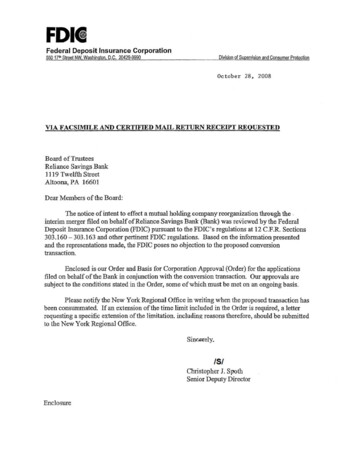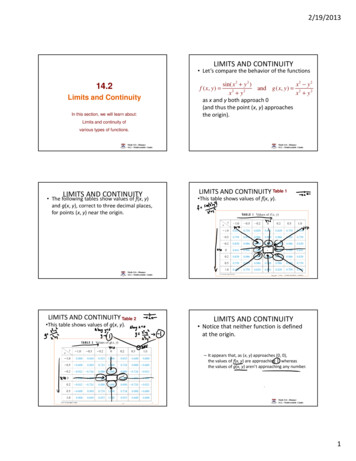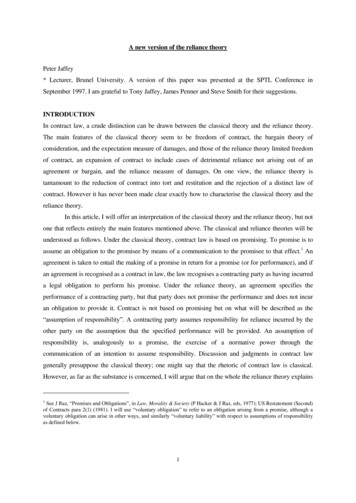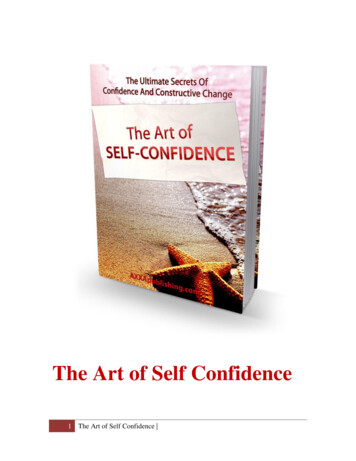
Transcription
The Limits of Self-Reliance: Emerson, Slavery, and AbolitionJames H. ReadProfessor of Political ScienceCollege of St. Benedict and St. John‟s UniversitySt. Joseph, MN 56374jread@csbsju.eduPresented to the annual meeting of the American Political Science Association, Toronto, Ontario,September 3-6, 2009Comments and correspondence welcome.AbstractIn the 1841 essay “Self-Reliance” Ralph Waldo Emerson presupposed a democratic society offree and equal individuals – an idealized America with a veil drawn over racial slavery. As hisown commitment to the antislavery cause deepened over time Emerson sought to reconcile hisideal of self-reliance with organized political action necessary to fight slavery.Recent scholarship has corrected the previously dominant image of Emerson as detached frompolitics and indifferent to abolitionism. But even as he participated in it, Emerson sawantislavery activism as a distraction from his own proper work of freeing “imprisoned spirits,imprisoned thoughts, far back in the brain of man.” Abolitionists, with their single-mindedpursuit of a cause, seemed to Emerson to have only a “platform existence, and no personality.”Emerson‟s philosophy of Self-Reliance privileged individual over collective action, and personalexperience over concern for distant evils. Emerson was most successful in synthesizing selfreliance with abolitionism when he urged resistance to the Fugitive Slave Law: individuals whoresisted the law displayed self-reliance of the kind Emerson celebrated. He also admired the selfreliance of individual fugitive slaves, despite his doubts about the capacities of the black race ingeneral and his ranking Anglo-Saxons over other races and peoples.Beyond resistance to the Fugitive Slave Law, Emerson‟s philosophy of Self-Reliance providedless clear guidance for fighting slavery, and Emerson himself vibrated among severalcontradictory strategies. His support for peaceful, compensated emancipation within an intactUnion was irreconcilable with his support for the violent measures of John Brown, whom hecelebrated as the model of American self-reliance.In the 1860 essay “Fate” Emerson reformulates the ideal of self-reliance in a way that reflects theescalating sectional crisis: only through cold-eyed recognition of necessity, he argues, can onepreserve a measure of self-reliance in a world that frustrates our will. This reformulation of selfreliance is more suited to human beings living through an inescapable political crisis, and in thatrespect an advance over the 1841 version. But it depends for its success on clearercomprehension of political causality than Emerson ever achieved.0
THE LIMITS OF SELF-RELIANCE: EMERSON, SLAVERY, AND ABOLITION“Self-Reliance” is central to the philosophy of Ralph Waldo Emerson, his most famousand attractive idea. Emerson challenges the individual to “set at naught books and traditions,” to“be a nonconformist,” to recognize that ideas, books, religions, institutions, and occupationsacquire life and value only when an individual enlivens them with his or her own experience andeffort. “Though the wide universe is full of good, no kernel of nourishing corn can come to himbut through his toil bestowed on that plot of ground which is given to him to till. The powerwhich resides in him is new in nature, and none but he knows what that is which he can do, nordoes he know until he has tried” (“Self-Reliance” from Emerson 2008, 54).From the beginning there have been critics who saw in Emerson‟s Self-Reliance a kind of“radical egoistic anarchism” that “vaporized the social world,” pitting the individual against thecommunity and its traditions and laws (Whicher 1953, 28-40). But Emerson never claimed that aself-reliant individual possessed unlimited freedom or complete understanding, nor was selfreliance inconsistent with fulfilling one‟s duties to others. The self-reliant human beingrecognizes his or her own limitations – must “take himself, for better or worse, as his portion” –but grasps that traditions, institutions, and received opinions are at least equally limited andimperfect. Self-reliant individuals recognize the call of justice and the obligation to fulfill dutiestoward others, but do so “in a new and unprecedented way”: not after the customs of others, butas their own inward perception of truth prescribes (Emerson 2008, 54, 66).As many scholars have noted, there is an affinity between Emerson‟s idea of self-relianceand the conditions of a democratic society. Emerson clearly assumes a society of free, equal, andmobile individuals when, at the expense of the “city dolls” of Boston or New York who are lost1
if no one hands them a plum position, he praises the “sturdy lad from New Hampshire orVermont, who in turn tries all the professions, who teams it, farms it, peddles, keeps a school,preaches, edits a newspaper, goes to Congress, buys a township, and so forth, in successiveyears, and always, like a cat, falls on his feet” (“Self-Reliance” from Emerson 2008, 67). GeorgeKateb describes Emerson‟s self-reliance as “a doctrine unthinkable outside democracy” (Kateb2002, 178). Judith Shklar presents Emerson as a critic of majoritarian democracy but one forwhom “democratic political experiences quite often gave his essays their intellectual purposeand direction” (Shklar 1990, 601).But was the United States in Emerson‟s time a democracy? That depended on the color ofone‟s skin. For an enslaved man or woman, the America of Emerson‟s time was a tyranny, not ademocracy; and -- as Emerson recognized -- the institution of slavery radically negates the ideaof self-reliance. If Emerson‟s philosophy of self-reliance is indeed closely connected with theconditions of a democratic society, then it follows, conversely, that it might not be especiallysuited to a slave society, or to one (like Emerson‟s antebellum United States) in which slaveryand democracy live in troubled coexistence. That Emerson‟s philosophy of self-reliancecondemns the practice of slavery is clear enough, but that is only the beginning of the problem.How to take action against slavery, without along the way compromising or suffocating one‟sown intellectual and practical self-reliance: that was the problem that increasingly preoccupiedEmerson in the years leading up to the Civil War.Recently scholars have begun revising the long-held image of Emerson as a thinkerdetached from practical politics and indifferent or downright hostile to abolitionism – an imageunfortunately reinforced by the (recently-corrected) unavailability of his antislavery writings and2
speeches. (See for example Len Gougeon‟s Historical Introduction to Emerson 1995.) Emerson‟santislavery commitments were genuine, publicly expressed on numerous occasions, andincreasingly radical after the passage of the Fugitive Slave Law in 1850. But where Emerson‟santislavery commitments fit within his philosophy as a whole, and to what extent the growingsectional crisis over slavery may have inflected his later writings, remain largely unexaminedquestions in the enormous critical literature on Emerson‟s thought.In this essay I re-examine Emerson by emphasizing several themes typically treated asmarginal to his philosophy of self-reliance: his antislavery addresses (especially his opposition tothe Fugitive Slave Law); his ambivalent relation to organized abolitionism; his peculiar theoriesabout race and human progress; and his own political choices during the deepening crisis overslavery.1 The slavery crisis put the idea of self-reliance to the test, and Emerson knew it. Theinstitution of slavery was both deeply unjust and radically incompatible with self-reliance, bothfor slave owner and slave. But whether it was possible to act effectively against an evil aspolitically and morally voracious as slavery, without compromising self-reliance along the way,was another question altogether.Emerson‟s original vision of Self-Reliance (in the 1841 essay of that title) took free andequal individuals as its point of departure and did not consider the way in which Americanslavery challenged that vision. In that essay Emerson was critical of abolitionists for what (fairlyor unfairly) he considered their lack of self-reliant thought and action. During the 1840s and1Judith Shklar in “Emerson and the Inhibitions of Democracy”(1990) does not mention Emerson’santislavery commitments. George Kateb, Emerson and Self-Reliance, (2002, 177-178) sees Emerson’s antislaveryactivity as an “aberration,” a “deviation” from self-reliance. See discussion below.3
1850s Emerson sought to reconcile his increasing (though still ambivalent) commitment to theantislavery cause with the categories of his philosophy of Self-Reliance and his understanding ofhis own calling as a philosopher-poet concerned about the whole human condition. He appliedthe ideal of self-reliance, with varying degrees of success, to a number of slavery-related issuesincluding the 1850 Fugitive Slave Law (which he insisted must be resisted); the spread of slaveryto new federal territories; the post-abolition prospects of the black race; and the darkeningshadow of violence, disunion, and civil war.The Fugitive Slave Law of 1850 radicalized Emerson‟s antislavery politics and at thesame time conveniently harmonized his self-reliant philosophy with the fulfillment of hisantislavery duties. Because the law required individuals of free states to cooperate in capturingfugitive slaves, slavery was no longer some abstract, far-off evil, but something personally andlocally experienced and resisted in exactly the way most appropriate to Emerson‟s philosophy ofself-reliance. Conservatives‟ insistence that the Constitution – including its fugitive slave clause– was sacred provoked Emerson to insist on a “higher law” than any traditionally-receivedpolitical text, just as he rejected the authority of religious texts in his famous Divinity SchoolAddress of 1838 (Emerson 2008, 29-44). Because the Constitution itself (Article IV, section 2)explicitly provided for rendition of fugitive slaves, Emerson‟s advice in “Self-Reliance” to “setat naught books and traditions” here drew its most political conclusion: a lifeless constitutionalclause was entitled to no more respect from a self-reliant individual than a lifeless religion orcustom or book. Emerson admired the self-reliance manifested by fugitive slaves – “this manwho has run the gauntlet of a thousand miles for his freedom” (“Address to the Citizens ofConcord,” in Emerson 1995, 58). He also saw the law as an assault on the self-reliance of free4
state citizens whom it required to cooperate in capturing fugitive slaves, against their ownjudgment and consciences.2But resistance to enforcing the Fugitive Slave Law fell far short of a comprehensiveattack on the institution of slavery, and here Emerson‟s philosophy of Self-Reliance providedless clear guidance. Even as he engaged in it, Emerson saw antislavery activism draining timeand energy away from his own proper work of freeing “imprisoned spirits, imprisoned thoughts,far back in the brain” (1852 entry, from Journals Vol. XIII, 80). The slavery issue was differentfrom most of the issues routinely faced by the citizens of a democracy, where one can speakone‟s mind, do one‟s duty, and then return to one‟s vocation. The obstacles to abolishing slaveryin the United States were so great that, unless one committed oneself completely to its abolition(as did full-time abolitionists like William Lloyd Garrison, Wendell Phillips, and FrederickDouglass) it was unclear whether one would accomplish anything at all. Emerson simultaneouslysensed the pull of total commitment against slavery and rebelled against its personal cost.Emerson also found it difficult to settle on any coherent political strategy for addressingthe problem of slavery. Though willing to risk disunion, he usually rejected the activesecessionism of Garrison, Phillips, and Thoreau – though on occasion he reversed course andadvocated secession. During the early 1850s he endorsed a gradualist policy of stopping theexpansion of slavery (the Free Soil and Republican Party platforms) combined with compensatedemancipation over the long term – a policy that presupposed an intact Union and peaceful2Here I completely agree with Jack Turner that for Emerson self-reliance was incompatible with knowingcomplicity with injustice. Turner 2008, 128.5
abolition. But later in the decade he lent political and personal support to John Brown‟s violentantislavery efforts in Kansas and, after Brown‟s abortive 1859 Harper‟s Ferry raid, celebratedhim as a hero and martyr. Once we get beyond resistance to enforcement of the Fugitive SlaveLaw – where his own philosophy provided relatively clear guidance – Emerson seemedpolitically rudderless during the 1850s in ways that call into question whether his brand of selfreliance can effectively address so politically complicated an evil as American slavery.Emerson‟s philosophy was always rooted in personal experience and for that reasonevolved and changed over time. Scholars have noted a very different tone in Emerson‟s laterwritings, particularly the keynote essay “Fate” from Emerson‟s 1860 book The Conduct of Life,where Emerson admits more fully than before the limits on free, self-reliant action and insiststhat only by embracing necessity can we preserve a degree of freedom in an obdurate world. Thisshift in Emerson‟s thinking has been attributed to a variety of causes. But scholars seem rarely tohave considered whether and to what degree the sectional crisis over slavery may have shapedEmerson‟s thinking in a book published on the eve of the Civil War.I argue that in The Conduct of Life Emerson offers a revised vision of self-reliance, onemore appropriate to political engagement than was the version of self-reliance put forward in1841. Emerson‟s increased emphasis on constraint in his later writings should be understood toinclude political constraints of the kind the slavery crisis underscored for everyone. In “Fate” heinsists that self-reliant individuals grapple with “the spirit of the times,” a requirement he had notstressed in his 1841 essay “Self-Reliance.”The later Emerson‟s revised, more sober and politically-engaged version of self-relianceis in some respects richer and more persuasive than his 1841 version. But it is also far more6
difficult to achieve; Emerson himself fell short of its demands by his less-than-completecomprehension of the political crisis through which he was living. Ultimately I conclude thatEmerson‟s philosophy of self-reliance reached its limits in attempting effectively to addressissues of slavery and abolition. His ideal of self-reliance is in the end more suited to a reasonablypeaceful, law-governed democracy characterized by free and equal individuals than to a world ofmasters and slaves, or a nation on the brink of civil war.II.What is most attractive in Emerson‟s idea of self-reliance is simultaneously what is mostproblematic: that what individuals make of their lives depends above all on effective andcourageous use of their own active mental and physical powers. External supports – economic,political, legal, intellectual, religious – are secondary. A self-reliant individual will find adequateexternal resources however challenging or primitive the social conditions; an individual lackingself-reliance will not achieve it through external assistance. “Nature suffers nothing to remain inher kingdoms which cannot help itself,” Emerson observes -- which shows that he does not limitthe principle to any particular type of society or even to the human species alone. (“SelfReliance” from Emerson 2008, 65).Emerson‟s idea of self-reliance is closely connected with his skepticism about societalprogress, at least in his early writings. (The idea of progress later becomes important to hisdiagnosis of the slavery problem.) To imagine that one‟s life would somehow be better, freer,and happier in some more advanced society than the one in which providence has placed one, isto fail at self-reliance. “All men plume themselves on the improvement of society; and no manimproves. Society never advances. It recedes as fast on one side as it gains on the other.”7
Progress is individual, not social. “No greater men are now than ever were.” “Reformerssummon conventions, and vote and resolve in multitude” to create a better world, but all in vain,because “It is only as a man puts off all foreign support, and stands alone, that I see him to bestrong and to prevail” (“Self-Reliance,” from Emerson 2008, 71-73).To illustrate the claim that self-reliance is independent of the advanced or backward stateof society, Emerson contrasts the “well-clad, reading, writing, thinking American, with a watch,a pencil, and a bill of exchange in his pocket” with “a naked New Zealander, whose property is aclub, a spear, a mat, and an undivided twentieth of a shed to sleep under.” The civilizedAmerican is not necessarily an improvement on the “wild virtue” of the autonomous savage; associety advances, “for every thing that is given, something is taken” (Emerson 2008, 71).What is most revealing here, given Emerson‟s own time and place, is precisely thecomparison he does not make. He does not compare either civilized man or savage man with thelife circumstances of a chattel slave – who was far more intimately connected to Emerson‟s ownsocial and political world than the savage New Zealander. Emerson‟s idealized savage has a hardlife, but he is free and for that reason can be self-reliant. If instead Emerson had claimed that theslave on a Southern plantation had just as much chance to achieve self-reliance under slavery,despite the whips, chains, and hounds than the “well-clad, reading, writing, thinking [white]American,” or that any slave truly capable of self-reliance will find his or her way to freedom,these would be hollow exhortations. He does not, of course, make these extreme claims. Butneither does he at any point in the essay raise the question of what implications, for hisphilosophy of self-reliance, follow from the existence on American soil of this massive andentrenched system of plantation slavery.8
The institution of slavery does make an offstage appearance in “Self-Reliance” in oneespecially harsh passage. “If an angry bigot assumes this bountiful cause of Abolition, and comesto me with his last news from Barbadoes, why should I not say to him, „Go love thy infant; lovethy wood-chopper: be good-natured and modest: have that grace; and never varnish your hard,uncharitable ambition with this incredible tenderness for black folk a thousand miles off. Thylove afar is spite at home‟” (Emerson 2008, 56). The passage is not necessarily directed againstall abolitionists but arguably only the “angry bigots” among them – though bigoted about what,or toward whom, is never explained. He does refer to “Abolition” itself as a “bountiful cause”(an odd label). Nevertheless the attack on abolitionism sweeps pretty broadly, and prefiguresEmerson‟s later critical remarks about William Lloyd Garrison and Wendell Phillips even asEmerson was making common cause with them; Emerson later calls Garrison‟s newsletter TheLiberator “a scold” (Emerson, Journals Vol. XIII, 282).More importantly, Emerson‟s attack here misfires: abolitionists had no alternative but todenounce evils “a thousand miles off” because they were not permitted to go south andabolitionize among the slaveholders and slaves, and because – as Emerson elsewhere realizes –New England was complicit in the fate of slaves “a thousand miles off.” Moreover, Emerson‟sproposed alternative – at least in this passage -- is not some less “bigoted” and more effectiveway of opposing slavery, but to urge the unnamed angry abolitionist to drop that activityaltogether, and love his own children and neighbors instead of lavishing “incredible tenderness”on “black folk a thousand miles off.” By that standard, a slaveholder who loved his own childrenand was decent to neighbors would be morally superior to the angry, graceless abolitionist.9
This particular passage from “Self-Reliance” was by no means Emerson‟s only or finalword on slavery and abolition. Nevertheless it is worth asking why Emerson included thispassage at all, and how it is connected with the problem of self-reliance.What seems to disturb Emerson here is that someone would act, and urge others to act, onthe basis of something abstract and distant rather than present and directly experienced. Citizensof Massachusetts who have (or believe they have) no personal connection to slavery, who neverpractice it, suffer it, or give it any thought whatsoever until a rhetorically persuasive abolitionistcatches their ear, acquire their political opinions secondhand and in that respect fail at selfreliance. They are instead (as Emerson remarks in an immediately preceding sentence)“capitulat[ing] to badges and names.” To adopt opinions about slavery secondhand, divorcedfrom any lived experience of the institution, is in principle no different than uncriticallyaccepting the dogmas of a church or the ideology of a party. A self-reliant individual “must learnto detect that gleam of light which flashes across his mind from within,” (Emerson 2008, 53)and this is no less essential for opinions about slavery than for opinions on other matters.In “Self-Reliance” abolitionist agitators seem to serve no useful purpose at all. By the1850s Emerson had become convinced that abolitionists and abolitionist rhetoric were essentialweapons in the battle against slavery; in that respect his position changed. What did not changewas his suspicion that abolitionist orators do not exhibit self-reliant thinking of the kind Emersonconsidered it his own mission to practice and foster in others. In an 1854 journal entry (writtenduring the peak of Emerson‟s public antislavery activity) Emerson observes:Of Phillips, Garrison, and others I have always the feeling that they may wake up somemorning and find that they have made a capital mistake, and are not the persons they tookthemselves for. Very dangerous is this thoroughly social and related life, whether10
antagonistic or cooperative. In a lonely world, or a world with half a dozen inhabitants,these would find nothing to do.The first discovery I made of Phillips was, that while I admired his eloquence, Ihad not the faintest wish to meet the man. He had only a platform existence, and nopersonality. Mere mouthpieces of a party; take away the party and they shrivel andvanish.They are inestimable for workers on audiences; but for a private conversation, oneto one, I must prefer to take my chance with that boy in the corner (Journals Vol. XIII,282)Emerson here (fairly or unfairly) characterizes abolitionist orators as individuals who think andact entirely to create an effect on an audience, who have no authentic inner life, who do not“know themselves,” and whose ideas are entirely reducible to the party or cause they represent.There is no “gleam of light” flashing across their mind “from within,” which for Emerson is theessential ingredient of mental self-reliance. And yet Emerson concedes that their work is of“inestimable” value, which highlights a tension between self-reliance and effective politicalaction that he never successfully resolved.The criticism of abolitionists in “Self-Reliance” perfectly explains why it was theFugitive Slave Law of 1850 (which gave teeth to a hitherto weakly enforced constitutionalclause) that propelled Emerson into vigorous antislavery activity. Because the 1850 lawobligated citizens of free states to assist in rendering fugitive slaves, it made the evil of slaveryimmediately and obviously something local and directly experienced. (For the fugitive slavebattles in 1850s Massachusetts, including Emerson‟s role in them, see Von Frank 1998.) In his1851 “Address to the Citizens of Concord,” Emerson proclaimed: “If our resistance to this law isnot right, there is no right. This is not meddling with other people‟s affairs: this is hinderingother people from meddling with us. This is not going crusading into Virginia and Georgia after11
slaves but this is befriending in our own state, on our own farms, a man who has taken the riskof being shot, or burned alive, or cast into the sea” (Emerson 2008, 139).So to assist a fugitive slave in Massachusetts, and to refuse to cooperate with legalizedkidnapping, is precisely to exhibit self-reliance in one‟s opposition to slavery. No one needs anabolitionist orator to tell him or her that this law is wrong; Emerson believes one‟s own naturalmoral sense will show the way. This is to offer assistance to a flesh and blood human beingwhom one can see and meet “in our own state, on our own farms,” not an abstract victim athousand miles away. Between 1841 and 1851 Emerson‟s thinking evolved and changed in manyways; but there remains a direct line between his critique of abolitionism in “Self-Reliance” andhis reasoning for urging resistance to the Fugitive Slave Law in 1851.To abolitionists like Garrison or Phillips, the 1850 Fugitive Slave Law merely madeobvious the free states‟ longstanding complicity in upholding slavery – even back in 1841 whento confront people with this truth made abolitionists appear “angry bigots.” Abolitionists offeredassistance to fugitive slaves, but never forgot the plight of the millions “a thousand miles off” forwhom escape was not possible. Emerson‟s preference for acting from direct local and personalexperience of slavery would have limited abolitionists‟ capacity to mount a comprehensivenationwide attack on the institution. Whether any effective, nationwide attack on slavery waspossible, and what strategy it would follow, was of course another question.III.To evaluate Emerson‟s troubled relation to abolitionism it helps to survey the range ofoptions – none of them good -- available to citizens of free states who judged the institution ofslavery radically unjust. Slavery was no ordinary political issue. It was the kind of evil for which,12
unless one threw all one‟s time and energy into the battle, one was unlikely to accomplishanything at all; yet one might throw oneself fully into the battle and still accomplish little. Whatin Emerson‟s case has sometimes been interpreted as indifference toward slavery appears in adifferent light once all the difficulties are taken into account. “I waked at night, & bemoanedmyself, because I had not thrown myself into this deplorable question of Slavery, which seems towant nothing so much as a few assured voices,” he wrote to himself in 1852. But this wouldmean “my desertion of my post, which has none to guard it but me. I have quite other slaves tofree than those negroes, to wit, imprisoned spirits, imprisoned thoughts, far back in the brain ofman, -- far retired in the heaven of invention, and which, important to the republic of Man, haveno watchman, or lover, or defender, but I.‟” (Journals Vol. XIII, 80). This passage reveals, notindifference toward slavery, but instead a fierce battle between two duties, both of whichEmerson recognizes as legitimate, and which come into conflict because the time demands offulfilling each duty are enormous. He was to remain divided between these two types of dutiesfor the remainder of his active life as writer and thinker.Citizens of free states found themselves in the peculiar position of being politically andmorally implicated in supporting the institution of slavery, without having any constitutionalright or power either to abolish the institution or to withdraw their support. Thus the usualreformist advice, to “work within the system” to effect change, rang hollow in this case. Even inthe unlikely event of a congressional majority committed to abolition of slavery, the antebellumConstitution prohibited the federal government from interfering with slavery in the states whereit existed. Any such action would have been unconstitutional, unenforceable, and greeted byimmediate secession of most slave states from the Union. Yet this same antebellum Constitution13
positively obligated citizens of free states to return fugitive slaves. And the federal governmentwas constitutionally obligated to “insure domestic tranquility,” which included, if necessary,assisting slave states in suppressing slave insurrections. Thus there was little a slavery-hatingcitizen of Massachusetts could directly accomplish through regular political channels to fightslavery in South Carolina or Georgia. A natural reading of the Constitution would appear to giveCongress the power to restrict or abolish slavery in federal territories not yet states (Article IVsection 3), and in the District of Columbia (Article I section 8); and this narrow channel forfederal action against slavery would become essential to the platform of the Republican Party atits birth in 1854. But Southern leaders threatened to dissolve the Union rather than allow slaveryto be subjected to future geographical confinement; this was not a bluff. (For the Southernperspective on the constitutional contest over slavery, see Read 2009.)Alternatively one might decide to forego political action and instead work to “changeminds and hearts” about slavery through books, speeches, petitions, and public informationcampaigns. The drawback of this strategy was not, as one might suppose, that it was too tameand safe – “mere words.” On the contrary, it was a dangerous activity, and downright impossiblewhere it mattered most: in the slave states themselves, where abolitionist mailings wereconfiscated by the local post office (with the complicity of the federal government), and anypracticing abolitionist would have been lynched on sight. Slaveholders regarded abolitionistspeech and writing as deliberate attempts to foment slave insurrections, and were ready to go toextreme lengths to prevent it from infecting their own communiti
general and his ranking Anglo-Saxons over other races and peoples. Beyond resistance to the Fugitive Slave Law, Emerson‟s philosophy of Self-Reliance provided less clear guidance for fighting slavery, and Emerson himself vibrated among several contradictory strategies. His support for peaceful, compensated emancipation within an intact










